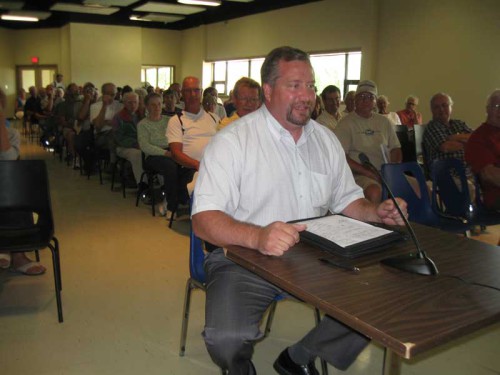The Recorder
LITTLE CURRENT—The approximately 300 people, made up of municipal council members, federal and provincial politicians, First Nation representatives, business people, cottage owners and permanent residents of the area, had the same message for the International Joint Commission (IJC) concerning low water levels in Lake Huron and Michigan; that a do nothing option is unacceptable and action needs to be taken now to curtail the decrease in water levels.
“We all want to work towards a solution on this issue, but we have grave concerns with this (International Upper Great Lakes Study Board) report,” stated Joe Chapman, mayor of the Town of Northeastern Manitoulin and the Islands (NEMI) at the hearing which took place in Little Current on Sunday. “You as a commission did not write the report, but you have to review it.”
“We accept the recommendations from the authors of this report concerning Lake Superior, but we reject entirely the recommendation that nothing be done to curtail lake water level decreases in Lake Huron and Michigan,” said Mr. Chapman. “This is absolutely unacceptable. And the interest of residents in southern parts of the Great Lakes are no more important than those in the upper lakes of Huron and Michigan. We reject the idea that there be no mechanical controls put in place for Chicago or the St. Clair River; if it’s satisfactory to put these controls in place for St. Mary’s River and St. Lawrence, why can’t similar remediation take place on St. Clair River?”
“We reject the idea that lake sturgeon in the St. Clair River area are more paramount than sturgeon and other fish species in Northern lakes—again this is not acceptable,” said Mr. Chapman. “We recognize we are not a large community, but we are probably one of the most effected by the recommendations being made.”
Iana Pollack of the IJC pointed out, “the final decision on the recommendations has not yet been made. Members of the public will be able to comment until August 31 at hearings like this, and we encourage anyone who wants to do so to write us with your comments.”
Carol Hughes, MP for Algoma-Manitoulin-Kapuskasing, said action needs to happen now. “You are meeting today on issues of great importance. Water levels in the Great Lakes are an important issue, especially for the upper lakes, Superior, Huron and Michigan. The loss of water in those bodies is disconcerting as we see volumes drop year after year.”
“This is not the time to claim that expenses cannot be afforded,” said Ms. Hughes. “We need the benefit of the best science that seeks solutions to the problem with a view to the long-term well-being of our Great Lakes first and foremost. These lakes are a common treasure and cannot be greated as commodities in the primary sense. It is only by acknowledging their intrinsic value that we can set about protecting them along with the economic values that these incredible bodies of water provide our two countries and the surrounding communities.”
Michael Mantha, MPP for Algoma-Manitoulin, stated, “water leaving rapidly is not acceptable, and we need to look at how and what to do to stop it. The loss of water is no longer acceptable. We don’t need further study and the diversion of water from the St. Clair River is no longer acceptable. This has been studied to death, we need to jump into action. Taking no action, as the study suggests, is not an option. We need to do something now.”
Serpent River First Nation Chief Isadore Day raised concerns with the lack of indigenous people being part of the process for the study report recommendations and said it must be remembered First Nations people have constitutional rights which spawn federal-provincial interests on both sides of the border. He said that it is incumbent that all these issues and rights are brought to the table.”
Thirteen hearings in total are being carried out by the IJC to garner public comment on the findings of the International Upper Great Lakes study released this past March, “Lake Super Regulation: Addressing uncertainty in Upper Great Lakes Water Water Levels.” The comments and recommendations from Upper Great Lakes jurisdictions in both Canada and the US are sought prior to the IJC accepting or rejecting the study and its recommendations.
One of the recommendations made in their report is the option of doing nothing to mitigate the Lake Huron outflow through the St. Clair River and into Lake Erie. One of the reasons for this is due to slowing down water outflow rates in the St. Clair could negatively impact its sturgeon population.
The report, prepared at the direction of the IJC, focused on the feasibility and implications of raising water levels by means of restoration structures in the St. Clair River to compensate for past natural and human-induced change.
The study considered restoration structures, including sills and underwater hydroelectric turbines, that could be placed in the St. Clair River to slow Lake Huron’s outflow and would come at a cost of between $30 and $170 million and could upset the natural spawning grounds of the endangered lake sturgeon. It would also take upwards of 20 years for such a commitment to take place. The study states that while restoration would increase water levels at low points in lakes Huron and Michigan, it would also mean raising levels to an “extreme high” in southern ports of the same lakes. The study report recommended against this kind of remediation in the St. Clair River.
Among the 35 speakers at the meeting was Jim Nies, a member of the Manitoulin Area Stewardship Council, and seasonal resident of Kagalong. “I spent weeks studying the study board report and every page I read, I got sicker and sicker, because it seems they have ignored the real problem for lakes Huron/Michigan, and focussed on the St. Clair River. I think we should be operating in a crisis mode and do everything possible to save our lakes. If things continue the way they are, the lakes maybe unrecognizable in a decade. We need action now.”
Therese Trainer, secretary of Manitoulin Area Stewardship Council (MASC), told the meeting, “Each day, over 200 million gallons of water pours out of Lake Huron. Some of this water is natural outflow, but the balance is illegal, never planned or approved and is the result of human error. The good news is that the Study Board and this commission recognize that there is a problem, but the bad news is nothing has been done yet. The amount of water that is being lost is much more than anticipated and this is an illegal diversion. Water is one of our four sacred gifts, and we would be remiss if we let it slip away.”
“I tried very hard to read the Study Board report with an open mind,” said Leslie Fields, a Manitowaning resident. “But I could not get past recommendation number seven, that no further study should be pursued at this time. We need our Great Lakes. Over 40 million people depend on them and in the last 20 years I have seen the lake slipping away. I urge you to focus on what will help and remind you that what we do now will affect the next several generations. We are in a crisis mode and doing nothing is not an option.”
“There are no recommendations for increasing levels, nothing about decreasing water flow, we are losing important fish habitat and our tourism is being gravely affected,” said Madeline Poynter, from the south shore of Manitoulin.
Paul Moffatt, Deputy Reeve of Assiginack, pointed out 200 residents of the municipality depend on the domestic water system and the other 200 residents draw water from South Bay and Manitowaning Bay.
“The decreasing water levels are causing many residents to have to increase the length of their waterlines, which is in turn costly for our municipality, which is mostly made up of elderly and low-income families,” he said. “And others in the municipality are having their wells dry up. Our once beautiful shorelines are now ugly mud flats, leaving many residents in conflict with the MNR as they attempt to maintain their shorelines. In our regular community, we appeal to you as one of the many small communities that rely on the Great Lakes to do something.”
Seija Deschenes, Manitoulin Streams Improvement Association program coordinator, said, “over the last 11 years, we have seen drastic changes and significant declines in our fisheries to our streams and around Manitoulin Island. Manitoulin Island has a sport fishing industry that grosses $9 million a year and has an economic spinoff of almost three times that much and there are over 50 resorts on this Island that depend on the health of our fisheries. All over Manitoulin we see important habitat that is high and dry covered with zebra mussels. Why did the study board recommend doing nothing? I really encourage you to do something. Please, our economy and fish habitat are dependant on your action.”
“I would like to address the final recommendation in the report, no restoration done to restore water levels for Huron-Michigan,” said Mary Ellen Shain, project coordinator for MASC. “By stating nothing should be done, St. Clair trumps Huron. This is not acceptable.”
Ms. Pollack said, “we are here because we take this very seriously. We have the authority to make suggestions for the kind of changes you have recommended, but on all matters, we personally don’t have the final authority. We do, however, have the responsibility to make recommendations to the US and Canadian governments. We thank you for your thoughts and encourage you to stay informed and continue to speak out to us and our government.”
For those that were unable to attend the meeting the study can be downloaded in both Word and PDF format at www.ic.org/iuglsreport. Comments will be accepted until August 31, 2012, and can be submitted via the IJC wesbite, email at commission@ ottaw.ijc.org, or in writing to Inernational Joint Commission, 234 Laurier Avenue West, 22nd Floor, Ottawa, Ontario, K1P 6K6.




